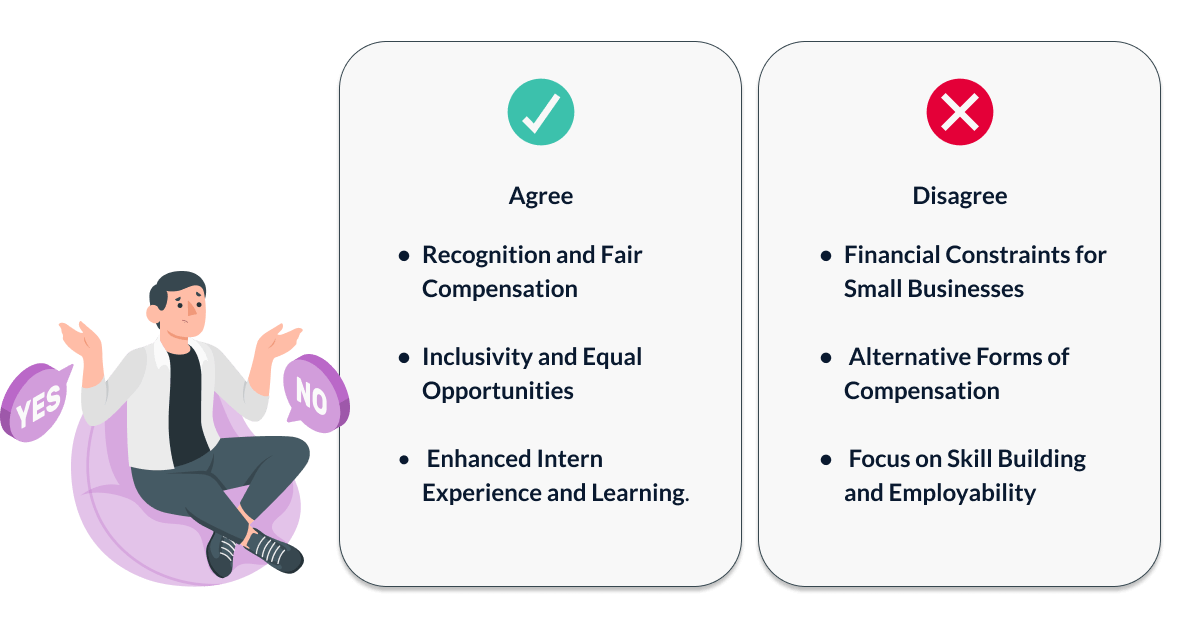Introduction:
The issue of whether companies in Malaysia should provide allowances for interns has sparked a heated debate. In 2023, differing perspectives emerge regarding this topic. This article presents two contrasting viewpoints on the matter, providing a balanced analysis to help shed light on the pros and cons of providing intern allowances in Malaysia.

Perspective 1: Supporting Allowances for Interns
1. Recognition and Fair Compensation:
Advocates for providing allowances to interns argue that it is crucial to recognise their contributions and efforts. Interns dedicate their time, skills, and energy to gain practical experience and contribute to the organisation. Offering a fair allowance demonstrates appreciation for their work, motivating them to perform at their best.
2. Inclusivity and Equal Opportunities:
Allowances can promote inclusivity and equal opportunities for interns from diverse socioeconomic backgrounds. Unpaid internships can unintentionally exclude individuals who cannot afford to work without compensation, perpetuating socioeconomic disparities. By providing allowances, companies level the playing field and ensure that internships are accessible to a wider range of talented students.
3. Enhanced Intern Experience and Learning:
When interns receive financial compensation, they are more likely to be fully engaged and committed to their tasks. This increased motivation translates into a better overall experience for the intern, leading to improved learning outcomes. Companies that invest in paid internships often provide structured programs, mentorship opportunities, and skill development initiatives, maximising the intern’s growth potential.
Perspective 2: Disagreeing with Providing Allowances for Interns
1. Financial Constraints for Small Businesses:
Detractors of providing intern allowances argue that it may place an additional financial burden on small and medium-sized enterprises (SMEs) in Malaysia. These companies may not have the resources to offer monetary compensation to interns, potentially deterring them from providing internship opportunities altogether. It is crucial to consider the potential negative impact on the sustainability and growth of SMEs.
2. Alternative Forms of Compensation:
Opponents of intern allowances propose that companies can compensate interns through non-monetary means, such as providing valuable learning experiences, mentorship, networking opportunities, and exposure to real-world projects. While financial compensation is important, these non-monetary benefits can also contribute significantly to an intern’s personal and professional development.
3. Focus on Skill Building and Employability:
Some argue that the primary goal of internships should be skill-building and improving employability rather than financial gain. Unpaid internships, when well-structured and designed, can offer interns valuable hands-on experience and the chance to develop practical skills that will benefit them in their future careers. The focus should be on the quality of the internship program rather than the provision of financial compensation.
Conclusion:
The debate surrounding whether companies in Malaysia should provide allowances for interns in 2023 presents two distinct perspectives. While supporting allowances highlights the importance of recognition, inclusivity, and enhanced learning experiences for interns, the opposing viewpoint emphasises the financial constraints on small businesses, alternative forms of compensation, and the focus on skill-building. Striking a balance between these perspectives is crucial to ensure fair treatment of interns while considering the realities faced by businesses in Malaysia. Ultimately, the decision on whether to provide intern allowances should be made after careful consideration of the specific circumstances and resources of each company, keeping in mind the goal of creating valuable and equitable internship experiences for all.





